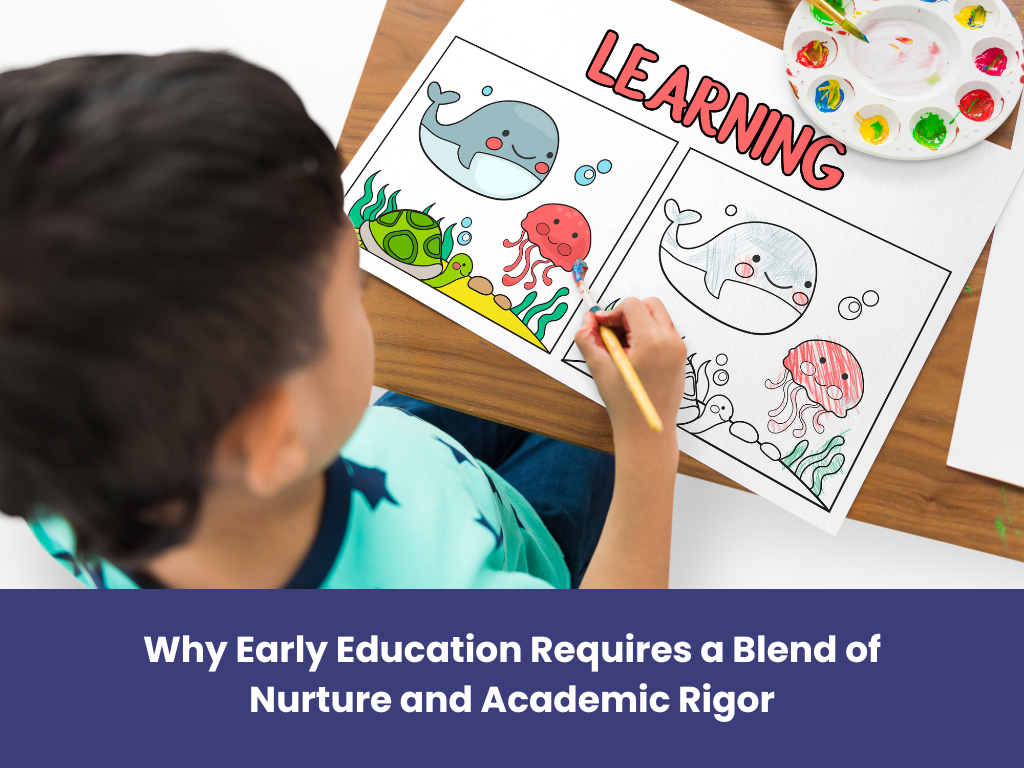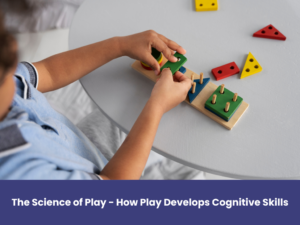The importance of early education in the developmental trajectory of children cannot be overstated. As the cornerstone of lifelong learning, emotional intelligence, and social skills, the approach taken during these formative years sets the stage for a child’s future. The ongoing debate on whether the focus should be on nurturing young minds or on academic rigor misses a crucial point: the necessity of a balanced approach that integrates both. We at The Navyandhra Play School, one of the top play school in Gurugram in this comprehensive exploration delves into why early education benefits significantly from a blend of nurture and academic rigor, underscoring how this synergy fosters holistic child development.
The Imperative of Emotional and Social Foundations
Nurturing in early education goes beyond mere affection; it encompasses creating a supportive, secure, and responsive environment that recognizes and addresses the emotional and social needs of children. This nurturing aspect lays the foundation for the development of trust, empathy, and the ability to forge successful interpersonal relationships. The establishment of a strong emotional base is paramount, as it directly impacts a child’s self-esteem, resilience, and capacity to navigate life’s challenges. It is within this nurturing context that children learn to identify and express their emotions healthily and develop the social skills essential for collaboration and empathy.
Catalyzing Cognitive Growth Through Academic Challenges
Academic rigor within early education should not be misconstrued as imposing overly structured or advanced academic work on young learners. Instead, it refers to engaging children in challenging, stimulating, and structured learning experiences that promote cognitive development. Appropriate academic rigor introduces children to new ideas, fosters critical thinking, and nurtures a curiosity-driven approach to learning. It is about creating an environment where learning is both enjoyable and intellectually stimulating, thereby laying the groundwork for academic excellence and a lifelong love of learning.
The Synergistic Effect of Blending Nurture and Rigor
The amalgamation of nurture and academic rigor creates a dynamic educational environment that addresses the multifaceted needs of developing children. This synergy ensures that children grow not only in intellectual capacities but also in emotional and social competencies. Educational settings that prioritize this balanced approach often report enhanced outcomes in children, including superior academic performance, better emotional health, and improved social skills. These children are more adept at dealing with complex situations, adjusting to new challenges, and pursuing continuous learning throughout their lives.
Beyond Theory: Practical Implementations and Success Stories
Evidence supporting the blend of nurture and academic rigor in early education is not just theoretical but is backed by practical successes. Innovative educational programs worldwide that have embraced this approach report remarkable improvements in student outcomes. These programs often feature smaller class sizes, individualized attention, a curriculum that encourages exploration and discovery, and a strong emphasis on social-emotional learning alongside academic instruction. The success stories emerging from such programs underscore the effectiveness of a balanced approach in fostering well-rounded individuals who excel academically, emotionally, and socially.
Addressing Equity and Access
A significant advantage of integrating nurture and academic rigor is its potential to bridge the gap in educational opportunities, particularly for children from underserved communities. By providing a nurturing yet challenging educational environment, all children, regardless of their socioeconomic background, have the opportunity to develop the critical skills and attributes necessary for success. This approach promotes equity in education, ensuring that every child has the chance to reach their full potential.
Looking Ahead – The Future of Early Education
As we look to the future of education, it is clear that the integration of nurture and academic rigor in early learning settings is more than a pedagogical choice; it is a necessity for preparing children for a complex and ever-evolving world. The challenge lies in implementing this balanced approach across diverse educational contexts, ensuring that every child benefits from a holistic educational experience. Educators, policymakers, and communities must collaborate to create inclusive, nurturing, and intellectually stimulating environments that support the development of the next generation of learners, leaders, and empathetic citizens.
In a Nutshell…
The path forward in early education is one that harmonizes nurturing care with academic challenge, recognizing that the true essence of education lies in fostering the comprehensive development of children. We at The Navyandhra Play School, one of the best daycare in Gurugram sector 43 believes that by embracing this balanced approach, we can ensure that our youngest learners are equipped with the tools they need to navigate their futures successfully and contribute meaningally to society.




